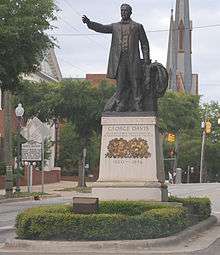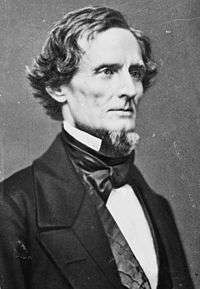George Davis (American politician)
George Davis (March 1, 1820 – February 23, 1896) was a Confederate politician and railroad counsel who served as the fourth and final Attorney General of the Confederate States from 1864 to 1865.
George Davis | |
|---|---|
 | |
| 4th Confederate States Attorney General | |
| In office January 2, 1864 – May 5, 1865 | |
| President | Jefferson Davis |
| Preceded by | Wade Keyes (Acting) |
| Succeeded by | Position Abolished |
| Confederate States Senator from North Carolina | |
| In office February 18, 1862 – January 2, 1864 | |
| Preceded by | Constituency established |
| Succeeded by | Edwin Reade |
| Personal details | |
| Born | March 1, 1820 Wilmington, North Carolina |
| Died | February 23, 1896 (aged 75) Wilmington, North Carolina |
| Nationality | American |
| Political party | Constitutional Union Party (1860), Democratic Party (until 1896) |
| Alma mater | University of North Carolina, Chapel Hill |
A skilled orator, he gave a notable public speech in March 1861 in which he argued that North Carolina should secede from the United States of America for the principal reason of protecting the economic interest in chattel slavery.
Biography
Early years
George Davis was born at Porter's Neck, near Wilmington, North Carolina. He attended the University of North Carolina at Chapel Hill and was valedictorian of its Class of 1838. He studied law and was admitted to the bar in 1840. In 1848, he became general counsel of the Wilmington & Weldon Railroad.[1]
1861 peace efforts
Davis at first opposed secession and backed the Constitutional Union Party in the Election of 1860. Following the election and prior to the inauguration of Abraham Lincoln, he was a delegate from North Carolina to the unsuccessful Washington Peace Conference of February 4–27, 1861.
He reportedly reacted badly to proposed compromise constitutional amendments that would have preserved slavery where it existed and also prohibited slavery in any territory of the United States "now held, or hereafter acquired" north of the latitude 36 degrees, 30 minutes line.[2]
Secession and slavery
On March 2, 1861 — just days after returning to Wilmington from the peace conference — Davis made a public speech in which he spoke of North Carolina's requirement of "property in slaves." He declared himself a secessionist and said that secession was required to protect slavery in North Carolina:
"The division must be made on the line of slavery. The State must go with the South."[3]
Secessionists placed him on a slate in which he was chosen a delegate to the Provisional Confederate Congress in 1861–1862. Davis was then elected to a two-year term in the Senate. But, he lost reelection to William Alexander Graham in 1863. To keep Davis in the foundering government, Confederate President Jefferson Davis in December 1863 appointed him Attorney General. Davis served in this position from January 2, 1864, until the Confederacy's debellation on May 5, 1865.
Davis never held any elected office outside the Confederacy or under the flag of the United States of America.
Fugitive and prisoner
Upon the collapse of the Confederacy, George Davis accompanied the fugitive government as far as Charlotte, North Carolina, then attempted to flee to England by way of Florida and Nassau. He was captured by United States forces at Key West, Florida, on October 18, 1865, and was imprisoned at Fort Hamilton in Brooklyn, New York. He spent several months at Fort Hamilton before being given his parole in 1866.
Later life
Again a free man, Davis chose to be a delegate to the 1866 National Union Convention. The convention was an attempt to unite white state leaders in support of Andrew Johnson's resistance to equal civil rights under law for non-whites and to Reconstruction.
After the failed convention, Davis returned to Wilmington. He rebuilt his law practice and worked as a railroad counsel. He died in 1896.
Memorials

Monument
A Confederate monument to Davis was dedicated by the United Daughters of the Confederacy in 1911, 46 years after the Confederacy's debellation.
On June 25, 2020, the statue, but not its pedestal, was temporarily removed by the City of Wilmington coincident with the firing of three police officers the city said had participated in "brutally racist" discussions recorded on official police equipment. To justify the dismantling, the city government cited the public safety exception within the state law intended to frustrate the removal of confederate monuments in North Carolina. The city did not announce a place of storage or a date for re-erection.[4]
Highway historical marker
In 1949, the North Carolina state government placed a highway historical marker to Davis on US Highway 17 at Porters Neck Road near Wilmington.[5]
Liberty Ship
In World War II, the United States liberty ship SS George Davis was named in his honor.[6]
References
- Buck Yearns. "Davis, George". ncpedia.org. State Library of North Carolina.
- "Amendments Proposed in Congress by Senator John J. Crittenden: December 18, 1860". Avalon Project.
- Buck Yearns. "Davis, George". ncpedia.org. State Library of North Carolina.
- WECT. "Two confederate Statues Removed from Downtown Wilmington." https://www.wect.com/2020/06/25/breaking-confederate-statues-removed-downtown-wilmington/
- "Marker D-36: "George Davis"". North Carolina Highway Historical Marker Program. North Carolina Department of Cultural Resources. Retrieved July 10, 2020.
- "Liberty Ships – Part 2: EMC #s 768 thru 1551". shipbuildinghistory.com. Archived from the original on October 10, 2011. Retrieved 2011-08-13.
Further reading
- Patrick, Rembert W. (1944). Jefferson Davis and His Cabinet. Baton Rouge: Louisiana State University Press. pp. 104–120.
External links
- "George Davis". Find a Grave. Retrieved April 14, 2009.
- Short biography csawardept.com

